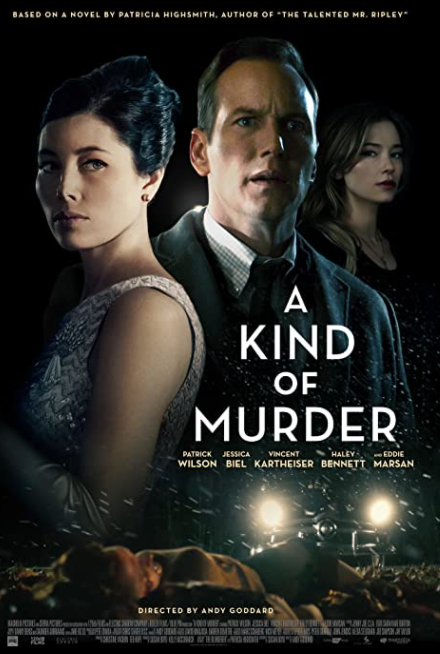
I just a late 2016 movie, A Kind of Murder, on Amazon Prime Video. It's advertised as "Hitchcockian Noir," which it's not -- somewhere between not quite and not by a long shot. But, then, again, Hitchcock's work is so uniquely masterful, I've never seen anyone else's work equal to what he did, including some who came close, like Brian De Palma.
[Spoilers ahead ... ]
Here's the story: Walter Stackhouse, a writer in 1960 New York, is in an unhappy marriage with a mentally distraught wife. He's writing some kind of murder mystery, and collects newspaper articles about lurid and/or unsolved crimes-- including a recent case in which the wife of a bookstore owner in New Jersey, Marty Kimmel, turns up dead. Laurence Korby, a detective who is no Sherlock Holmes and has a nasty violent streak to boot, is sure Kimmel did it. When Stackhouse's wife, who tried to take her life with pills turns up dead in New Jersey, Korby isn't sure where her murderer is Kimmel or Stackhouse, because (as we should know from umpteen police dramas), the husband is always the first suspect.
So this is a pretty good, even excellent, set-up. And the acting (especially Patrick Wilson as Stackhouse and Eddie Marsan as Kimmel, but also Vincent Kartheiser as Corby, Jessica Biel as Mrs. Stackhouse, and Haley Bennett as his girlfriend) and the ambience are excellent. But the ending chooses to be stylishly ambiguous, rather than giving us the satisfaction of an answer to the whodunnit.
All we know for sure as the closing credits role is Kimmel killed his wife. He possibly/likely killed Corby and Stackhouse, too, though the scene was so dark you had to look twice to be sure. And, then, in the last scene, as Stackhouse is on his back, apparently dying from the wounds Kimmel inflicted, we see him going over in his mind all the major scenes of the movie, concluding with him sitting in his apartment at his typewriter, typing "the end".
So is he envisioning all of that including the typewriter in his mind as he takes his dying breath on the damp concrete? Or is he actually sitting at his typewriter typing "the end" -- the end to the whole story he has typed, which we just saw on the screen?
Well, I do like ambiguity in an ending -- like in "The Lady and the Tiger" or in the last scene of The Sopranos, but as I said, in "A Kind of Murder," that just too ambiguous by half. Or, as my wife said, maybe that's why the movie, an adaptation of The Blunderer, a 1954 novel by Patricia Highsmith, is called A Kind of Murder.

1 comment:
This was a brilliant review! Thank you for posting this! I viewed A Kind of Murder this evening for the second time in four years and the above article helped me answer some of the many questions I had bouncing around in my mind.
Great job.
Post a Comment